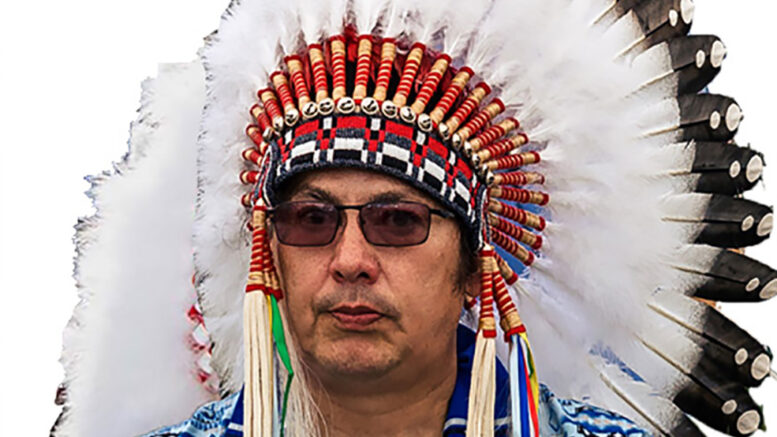By Jeremy Appel
(ANNews) – The chief of Cold Lake First Nations says that none of his concerns with the Pathways Alliance’s proposed carbon storage hub on his people’s traditional territories have been addressed.
“It just seems like everything is getting rubber stamped,” Chief Kelsey Jacko told Alberta Native News from the sidelines of the Carbon Capture Canada conference in Edmonton on Sept. 11.
The Pathways Alliance is composed of Canadian Natural Resources, Cenovus Energy, ConocoPhillips Canada, Imperial, MEG Energy and Suncor Energy, which together represent 95 per cent of tar sands production.
Their signature project is a 400-km network of pipelines transferring carbon dioxide from oil sands production facilities in northern Alberta to a subterranean storage hub near Cold Lake, Alta. The consortium began filing paperwork for regulatory approval from the Alberta Energy Regulator in March.
Last year, Chief Jacko criticized the alliance’s consultation process when he spoke on stage at the conference.
“They’re ramming it down our throats,” he said.
Jacko wasn’t invited to speak again at this year’s conference, but attended as a delegate, in part to get answers from Pathways, which had a booth set up in the northeast corner of the Edmonton Convention Centre’s exhibition hall.
Foremost among his concerns is the megaproject’s lack of an emergency management plan, which he said he was told would only be developed after the project was completed.
“Everybody thinks about the economic side of things, but our environment is suffering,” he added.
Jacko is especially worried about the impact of injecting carbon underground on his people’s water supply.
“It’s very dear to me, because we still have a beautiful lake and I want my lake to be beautiful for the ones yet to come, for the next seven generations,” he said.
Getting straight answers has been difficult, Jacko said, in part because every time representatives from Pathways approach him, he has to make his case to a different person.
“It’s hard when you’re [always] dealing with new people,” he said.
According to Chief Jacko, Pathways has made 146 separate applications for regulatory approval.
“A lot of nations don’t have the capacity that our nation does, and it feels like they’re being left behind,” he said.
The alliance has grouped all Treaty First Nations and Métis communities in the project’s vicinity together, as if their concerns are identical, which Jacko characterized as a “slap in the face when you’re talking about historic treaties.”
The federal government is part of the problem, he added, noting that they’ve thus far refused to order an environmental impact assessment, since the proposed hub is on private, not Crown, land.
“But when you talk about traditional territory, it affects us all,” said Jacko.
In May, online news outlet The Narwhal revealed that alliance president Kendall Dilling wrote a letter to the federal government in 2023 requesting that the project not be subject to an impact assessment.
Environment and Climate Change Minister Stephen Guilbeault told the outlet that it would be premature for the federal government to order an assessment because the project’s application wasn’t completed.
Across the exhibition hall from the Pathways booth was Enbridge, which hosted an information session on the Wabamun Carbon Hub in northwest Edmonton, slated for opening in 2027.
The Wabamun project has support from five Indigenous communities in its vicinity -Alexander First Nation, Paul First Nation, Enoch Cree Nation, Alexis Nakota Sioux Nation and the Lac Ste. Anne Métis Community Association.
Through the First Nation Capital Investment Partnership, these communities will have an opportunity to co-own the hub.
Nicole Baker, Enbridge’s senior advisor of Indigenous community engagement, said that prior to the project’s development, the company reached out to the nearby Indigenous communities to ask if they wanted to be involved in it.
In 2022, Enbridge officials participated in a pipe ceremony with community leaders at Enoch, which Baker emphasized was symbolically important.
“Similar to how when treaties were formed in this country, it was done in a pipe ceremony. Yes, there was a signed contract, but for the Indigenous people, our ways of entering those contracts and committing to each other is through the pipe ceremony,” said Baker, who is from Red Pheasant Cree Nation.
During the question-and-answer session, Baker added that Enbridge essentially came to the Indigenous leaders “with a blank sheet.”
“It wasn’t like, ‘Here’s our hub, here’s our plan, here’s what we’re laying out for you. Take it or leave it.’ It was very much like, ‘Is this something you’re interested in? Do you have any concerns? Let’s work through that,’” she said.
She emphasized that “not every single person in the community is jumping up to praise CCUS,” suggesting that the way Pathways has proceeded with its project has raised concerns among members of the Wabamun communities.
“There’s still a lot of conversations that need to be had, from the leadership level, down to everyone, and there’s still a lot of questions,” said Baker.
Chief Jacko of Cold Lake First Nations said that he’s not opposed to hosting a carbon storage hub on his people’s traditional lands, but wants to see a “hard reset,” in which Indigenous communities are consulted from the outset of planning.
If that doesn’t occur, he said he’s prepared to take the Pathways Alliance to court, which he recognizes will be a costly and time-consuming process.



Be the first to comment on "Cold Lake First Nations’ concerns about carbon storage hub are still not addressed"